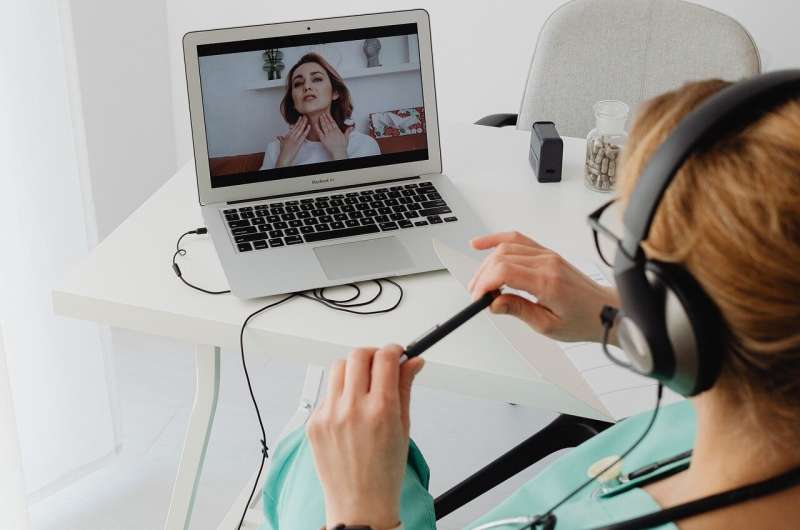This article has been reviewed according to Science X's editorial process and policies. Editors have highlighted the following attributes while ensuring the content's credibility:
fact-checked
proofread
New research in finds telemedicine consistently outperforms in-person visits for cancer care when both are available

New research in the May 2023 issue of the Journal of the National Comprehensive Cancer Network from Moffitt Cancer Center finds that telemedicine consistently outperformed in-person visits for both access to care and provider response, according to a long-term study on patient experience.
Researchers analyzed survey responses from 39,268 patients across more than 50,000 visits. Telemedicine experiences were compared to in-person visits during and after the height of the COVID-19 pandemic, starting April 1, 2020, and running through June 30, 2021.
"The pandemic forced a reshuffling of precious health care resources. Providers looking after cancer patients needed innovative approaches for high-quality and timely care," said lead researcher Krupal B. Patel, MD, MSc, Moffitt Cancer Center. "Anecdotally, we knew from the feedback of clinical providers that our telemedicine implementation was effective and efficient. However, it was important to have surrogate outcome measures from the patients' perspective. Patient experience surveys provided us with an opportunity to study this in more detail."
The researchers reviewed Press Ganey survey data from 33,318 patients who had in-person visits and 5,950 patients with telemedicine visits. When it came to access to care, 62.5% of in-person visits were rated as highly satisfying, versus 75.8% for telemedicine. The corresponding rates were 84.2% in-person and 90.7% via telemedicine for high satisfaction with the response and amount of concern demonstrated by their care provider. There were no significant changes over time for either category.
"Telemedicine visits can be incorporated in patients' day-to-day schedule so they can complete their appointments before or after work, or during a break. It gives them flexibility and ultimately increases access," added senior researcher Philippe E. Spiess, MD, MS, Moffitt Cancer Center, who is also a Member of the NCCN Board of Directors, Guidelines Steering Committee, and Vice-Chair of the NCCN Guidelines Panel for Bladder/Penile Cancers. "As care providers we should be leading the discussion and advocating on our patients' behalf for both cross-state licensing and continued reimbursements for telemedicine visits."
"Many of our institutions were forced to adopt telemedicine visits in response to the COVID-19 pandemic. This large, retrospective study shows the patient experience was similar to, or better than, in-person visits during the study period," commented Travis Osterman, DO, MS, FAMIA, FASCO, Associate Vice President for Research Informatics, Vanderbilt University Medical Center, a Member of the NCCN EHR Oncology Advisory Group—who was not involved in this research. "Going forward, oncology practices need to consider telemedicine as an option for appropriate patients."
The study also references previous research into care provider perspectives on telemedicine, and the potential for reducing costs such as travel, parking, and housing arrangements. However, the researchers note that not all oncology visits should be virtual. Careful patient selection is critical to determine which patients must be seen in-person for tests and other treatments.
More information: Philippe E. Spiess et al, Telemedicine Adoption in an NCI-Designated Cancer Center During the COVID-19 Pandemic: A Report on Patient Experience of Care, Journal of the National Comprehensive Cancer Network (2023). DOI: 10.6004/jnccn.2023.7008

















